(english below) Mark Andersen es una de las figuras claves del punk en DC para los que entendemos el punk como algo más que música. A través de la organización Positive Force (que es de carácter asambleario) ha estado trabajando para hacer real la retórica punk (a saber: solidaridad y apoyo mutuo) siempre en un contexto tan difícil como puede ser Estados Unidos.
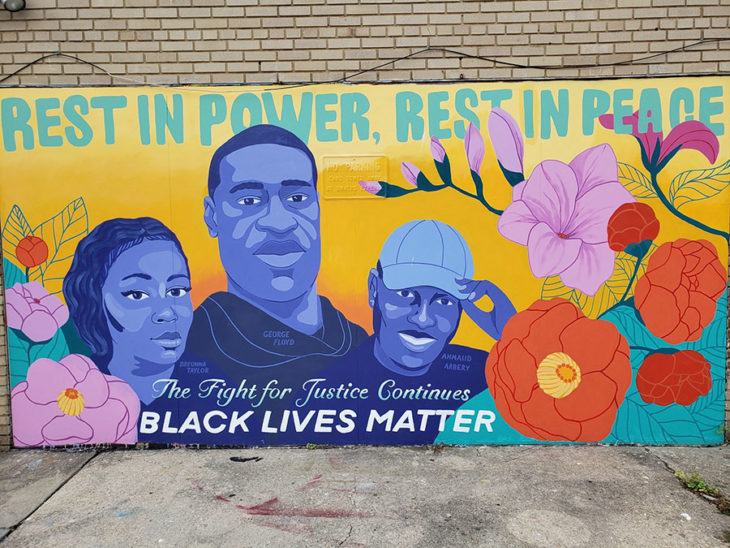
Olvidamos o pasamos por alto fácilmente que el punk siempre ha estado vinculado al activismo político. ¿Qué significa el punk para ti, qué voz te ha dado?
Esta pregunta es difícil de responder en poco tiempo. Supongo que empezaría diciendo que a mediados y finales de los años 70, en la Montana rural donde crecí, el punk lo significaba TODO para mí. Sobre todo, significaba la VIDA misma, porque -en aquel momento- no estaba seguro de si valía la pena vivir, dado lo estrechas que parecían ser mis perspectivas. Pero la música, las ideas y la energía de artistas como Patti Smith, Sex Pistols, The Clash, X-Ray Spex, Stiff Litttle Fingers, Avengers, The Dils y otros, me ayudaron a creer en mí mismo y en la posibilidad de vivir. Este lugar de afirmación personal, sin embargo, fue el punto de partida. La música y su mensaje me ayudaron a conectar mi lucha con la de otros en el mundo más amplio y a empezar a hacer causa común con mucha gente que estaba mucho más objetivamente marginada y/u oprimida que yo. (Para los que estén interesados, hablo de esto con mucha más extensión en All The Power: Revolución sin ilusión, disponible en akashicbooks.com)

Aquella ola histórica de los años 70 que dio forma a una nueva contracultura como el punk sigue viva y alienta muchas experiencias autogestionadas. ¿Qué cree que tiene el punk/HC que inspira a tanta gente?
Para mí, fue la pasión totalmente visceral, cruda y accesible de la música lo que me inspiró y sigue inspirando a otros. No era sólo un producto de consumo. En el punk existía/existe la sensación de que la vida es muy importante y que todos tenemos un papel que desempeñar, que debemos hablar y actuar para crear nuestra propia -esperemos que mejor- realidad. “Tienes que tener un propósito o este lugar te va a noquear/tarde o temprano”, cantaba The Clash hace más de 40 años y sigue siendo cierto. Lucha por lo que quieres que sea tu vida, tu mundo… esa lucha en sí misma es un regalo, una ruta hacia la felicidad y el significado para cada uno de nosotros.
Y ahora Dischord cumple 40 años (bueno, en 2020 fue)… y ¿cómo Dischord en DC inspira a tanta gente… también y USA?
Unos cuarenta años después, Dischord significa lo que siempre ha significado: TÚ PUEDES HACERLO. La ética del “hazlo tú mismo” brilla en todo lo relacionado con el sello, así como el sentido de que las personas importan más que el dinero y, por último, lo más importante, que la forma en que el mundo dice que “tienes” que funcionar está abierta a ser cuestionada. El hecho de que Dischord siga haciendo lo que hace, en sus propios términos, sin disculparse, es una inspiración continua para cualquiera que siga abierto a las posibilidades de la vida, dispuesto a desafiar al mundo y a nosotros mismos.
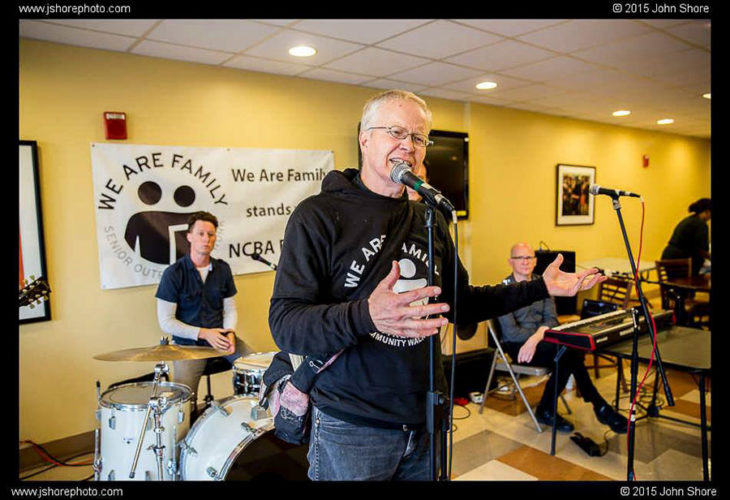
Revolution Summer fue la respuesta que disteis al agotamiento existencial dentro de la escena. Háblanos un poco de la génesis de Positive Force.
Para mí, Positive Force fue una respuesta muy personal a mi sensación de que el punk había perdido el rumbo, que la fuerza que me había inspirado a creer en mí mismo, a vivir, hablar y crear estaba en problemas, que necesitaba un enfoque y una dirección renovados. Sentí que me habían dado mucho; ahora era el momento de devolverlo. Este es el ciclo natural y saludable de la vida. También tiende a establecer un “círculo virtuoso” en el que el bien que damos vuelve a nosotros, regenerando nuestra propia capacidad de ofrecer algo de valor, algo real para luchar por la justicia, para ser verdaderos, para mejorar la vida para todos. Fundamentalmente, la Positive Force era una forma práctica para muchos de nosotros de poner en práctica nuestra retórica punk, de “vivir la vida” de la que cantábamos/hablábamos.
El punk era mi vehículo, simplemente por mi propia historia personal. La increíble sorpresa fue que -milagrosamente- las personas adecuadas estaban en el lugar correcto en el momento adecuado, creando la masa crítica para Revolution Summer, una reinvención del punk que nos empujó al siguiente nivel de vida, y estableció un estándar para el crecimiento continuo. Para mí, esa energía sigue resonando y sigue transformando mi vida para mejor.
Otros miembros de los primeros años de Positive Force, por supuesto, tenían sus propias motivaciones y visiones, pero creo que todos estábamos unidos en torno a la idea de que juntos podíamos lograr el cambio, en nuestras propias vidas y en el mundo. Nos ayudamos mutuamente a alcanzar lo mejor de nosotros mismos sabiendo que -como dice una de las primeras letras de Chumbawamba- “el aislamiento es la mayor barrera para el cambio”.
(Para más información, véase Dance Of Days: Two Decades of Punk in the Nation’s Capital, disponible en askashicbooks.com).
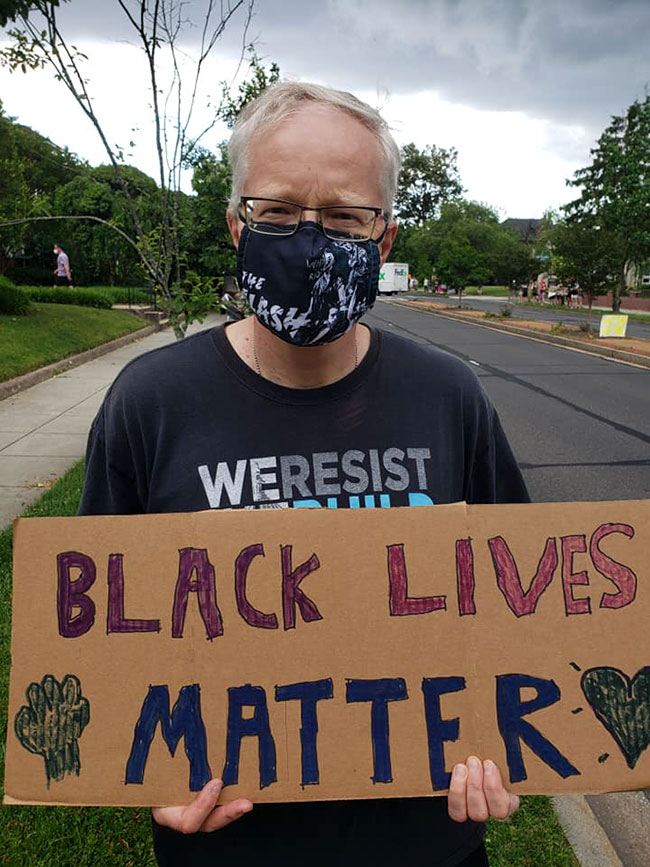
¿Qué tipo de actividades realizan en Positive Force?
Desde el principio, PF hizo muchos tipos de acciones diferentes. Éramos/son más conocidos por nuestros conciertos benéficos, más de 500 en los últimos treinta y cinco años, que concienciaban sobre temas cruciales, conectaban a la gente con oportunidades de voluntariado, protestas y otras formas de acción directa, a la vez que recaudaban cientos de miles de dólares para organizaciones que trabajan para transformar nuestro mundo.
No es de extrañar que la Positive Force haya llevado esta energía a otras vías, organizando manifestaciones, proyecciones de películas, exposiciones de arte, grupos de discusión de libros y realizando un trabajo directo para ayudar a las personas sin hogar, los ancianos, los drogadictos y los jóvenes en situación de riesgo. Aunque la pandemia de COVID ha hecho que el FP entre en pausa, su energía sigue estando especialmente presente en el alcance y la defensa de Somos Familia, una organización de base sin ánimo de lucro que surgió del PF y que ha estado increíblemente activa en la primera línea de la crisis.
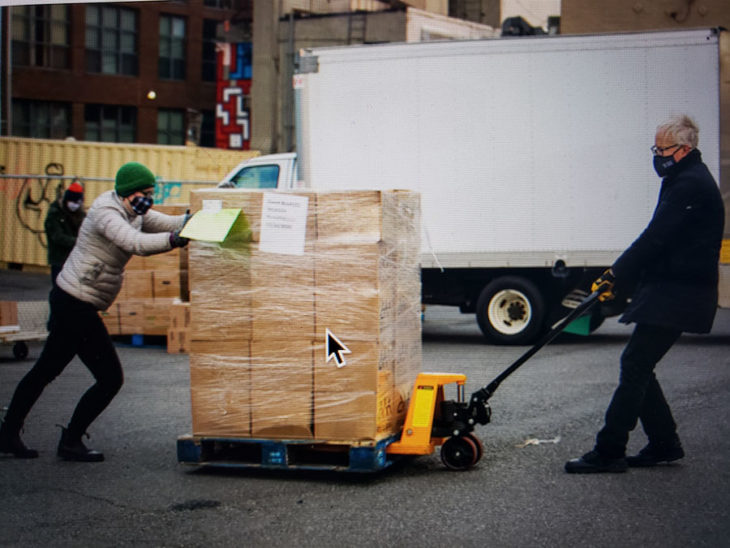
Los punks de DC sacrificaron el lujo y el materialismo para darse la libertad de explorar algo real. ¿Explorar lo real y hacer cosas juntos es una de las experiencias más genuinas que se pueden tener en el punk
Vivir con sencillez es una forma de eliminar lo superfluo para dejar espacio a lo esencial. Ciertamente, era el procedimiento operativo estándar para la mayoría de los punks de DC, ya que nos daba la oportunidad de dedicarnos al arte y al activismo más plenamente. Simplemente, teníamos que vivir a bajo coste, para no gastar todo nuestro tiempo y energía en la simple supervivencia. Nos ayudamos mutuamente a tener esta libertad; así que sólo deberíamos hablar de “DIY” junto con “DIT”: hazlo tú mismo, pero hazlo juntos. Creo que la idea fundamental que nos impulsa es -como cantaba Fugazi- “no eres lo que posees”. No es una idea nueva, ya que los manuscritos antiguos citan a Jesús de Nazaret -por ejemplo- argumentando que “la vida de uno no consiste en la abundancia de sus posesiones”. Sin embargo, dado que el poder del capitalismo está en todas partes, impulsándonos hacia el enfoque opuesto, a encontrar nuestro sentido último en el consumo, vale la pena repetirlo a diario. Tener acordes potentes, bajo y batería para llevar la lección a casa también ayuda.
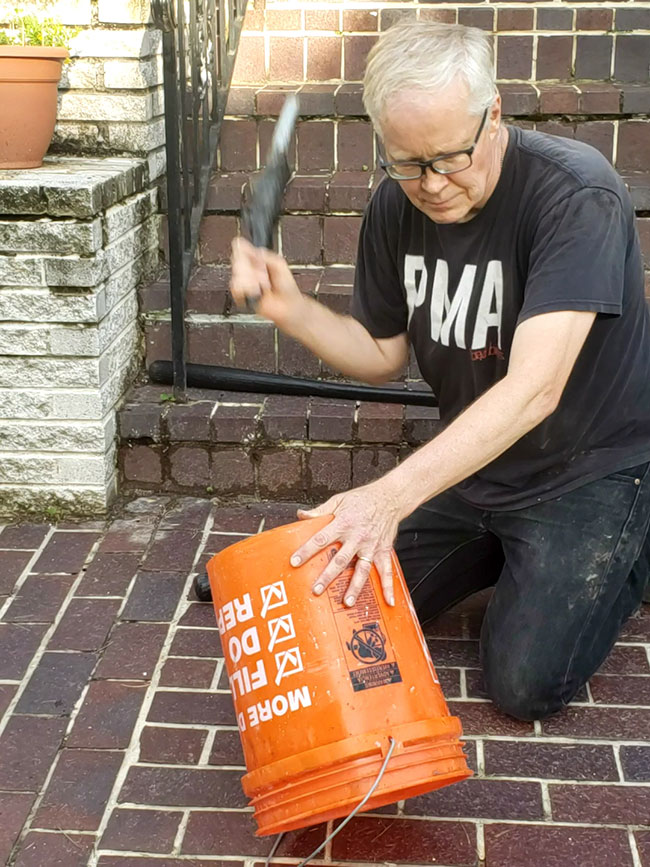
Uno de los proyectos en los que estás involucrado ahora es We Are Family, que se centra en la solidaridad con los ancianos, los olvidados. ¿Cómo va el proyecto, qué aceptación ha tenido?
We Are Family es, para mí, el resultado más orgulloso y significativo de Positive Force y del DC punk en general. Toma la energía, la pasión y la creatividad del punk y la convierte en acciones concretas para mejorar vidas, fomentar la justicia y crear una comunidad verdaderamente compasiva e inclusiva. Esta misión tiene un significado especial en medio de la crisis de COVID, pero también en general en una comunidad como DC, forjada a partir de un idealismo traicionado por la injusticia racial, la desigualdad económica y la corrupción. Para mí, We are Family es una forma práctica de vivir una verdad sencilla y revolucionaria: somos hermanas y hermanos de una misma familia y tenemos que cuidarnos mutuamente. En este momento, eso significa que trabajamos con más de 1.000 personas mayores en el centro de la ciudad de DC cada mes, proporcionando alimentos, estímulo, defensa y esperanza, trabajando desde una red de base de liderazgo de personas mayores. We Are Family sólo tiene dos empleados remunerados; la mayor parte de nuestro trabajo lo realizan voluntarios. Esto se debe en parte a la intención -sentimos que todo el mundo tiene la responsabilidad de cuidar de sus vecinos, de asegurarse de que todos tienen lo que necesitan para vivir-, pero también es una respuesta a la realidad de que los recursos son limitados, por lo que tenemos que hacer lo mejor que podamos con lo que tenemos dondequiera que estemos en este momento. Nuestro enfoque del “poder de la gente” nos permite hacer una inmensa cantidad con los recursos más escasos; sin duda, una poderosa aspiración punk.
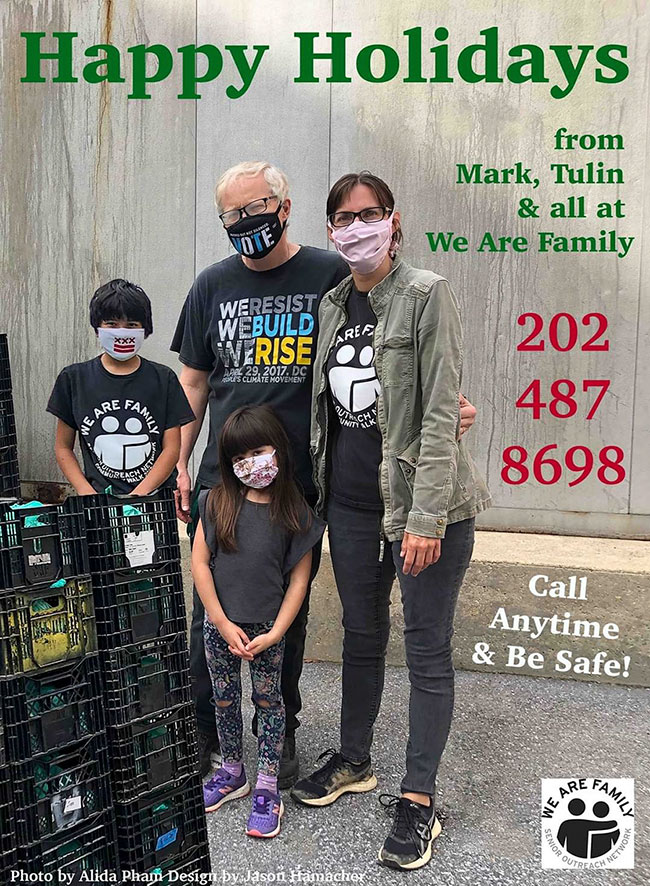
Vivimos en la utopía de estar conectados, pero nos olvidamos de los que nos rodean y especialmente de nuestros mayores. ¿Es la soledad una epidemia capitalista?
Siempre que el beneficio sea más importante que las personas (u otros seres vivos) veremos resultados venenosos, ya sea en la destrucción del medio ambiente, el hambre, la desigualdad, el maltrato a los animales o simplemente en la soledad, especialmente de los abandonados en los márgenes de nuestra sociedad o explotados para hacer dinero para los ricos. La tecnología puede ayudarnos y obstaculizarnos en este sentido; necesitamos conectarnos en carne y hueso más que virtualmente, aunque a veces ambos pueden trabajar juntos poderosamente para el bien. Sin embargo, tenemos que hacer que esto ocurra, no se producirá por sí solo; no con todas las posibilidades de obtener beneficios que hay de mantenernos atomizados, como consumidores aislados. Para ser justos, yo no culparía simplemente al capitalismo. Los seres humanos tienen un gran potencial de compasión y empatía, pero también de ensimismamiento y prejuicios. Por supuesto, ayuda cuando nuestros sistemas fomentan el bien común en lugar del egoísmo, así que tenemos que avanzar hacia un cambio fundamental en ese nivel.
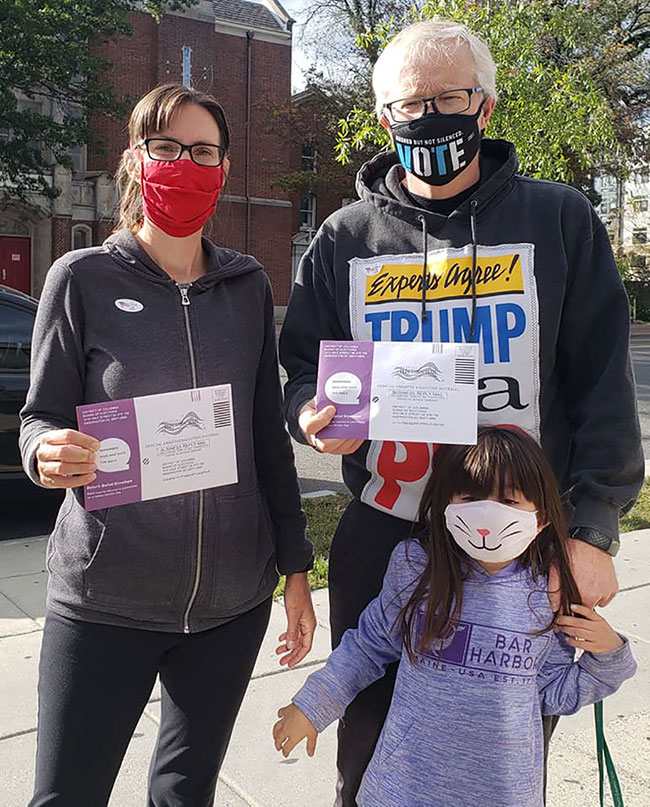
El ascenso de Trump tiene obviamente razones objetivas y variadas. ¿Cuáles cree que han sido las razones subyacentes al éxito de Trump?
Lamentablemente, parte de la razón del ascenso de Trump es simplemente el legado de racismo, violencia y xenofobia de la historia estadounidense. El genocidio y la esclavitud fueron piedras angulares en la creación y el ascenso de nuestro país; tenemos que admitirlo de entrada, o estaremos perdidos. El tiempo ha erosionado algo de esto en los últimos dos siglos, y se han hecho progresos… pero el veneno sigue ahí, justo debajo de la superficie. Trump lo ha explotado hábilmente y, por supuesto, él mismo encarna esa fealdad.
Sin embargo, también es cierto que las élites económicas y políticas de Estados Unidos -comenzando especialmente por Ronald Reagan- traicionaron a la gente común al abrazar el neoliberalismo. Este fundamentalismo del “libre mercado” generó una gran riqueza para algunos y una gran miseria para otros, especialmente los del corazón industrial. Esto no fue exclusivo de Estados Unidos, sino que fue un fenómeno mundial; Margaret Thatcher desempeñó el mismo papel en el Reino Unido, a menudo en concierto con Reagan, como detalla mi libro We Are The Clash. Juntos, lo difundieron a lo largo y ancho. Bill Clinton y Tony Blair respondieron empujando a sus respectivos partidos demócrata y laborista en la misma dirección, por desgracia. Esto abrió el camino para que un demagogo como Trump revolviera la mezcla política abrazando políticas pseudo-populistas que ganaron a los antiguos demócratas a su campo y ganaron por poco las elecciones en 2016. Lo mismo ocurrió en el Reino Unido con el Brexit, por supuesto. No podemos derrotar en última instancia a Trump y su movimiento sin reconocer los costes del capitalismo global e insistir en una nueva negociación más justa para la clase trabajadora y los pobres, como tan bien ha hecho Bernie Sanders, por ejemplo. Tampoco podemos renunciar a ganar a algunos de sus partidarios para nuestro lado.
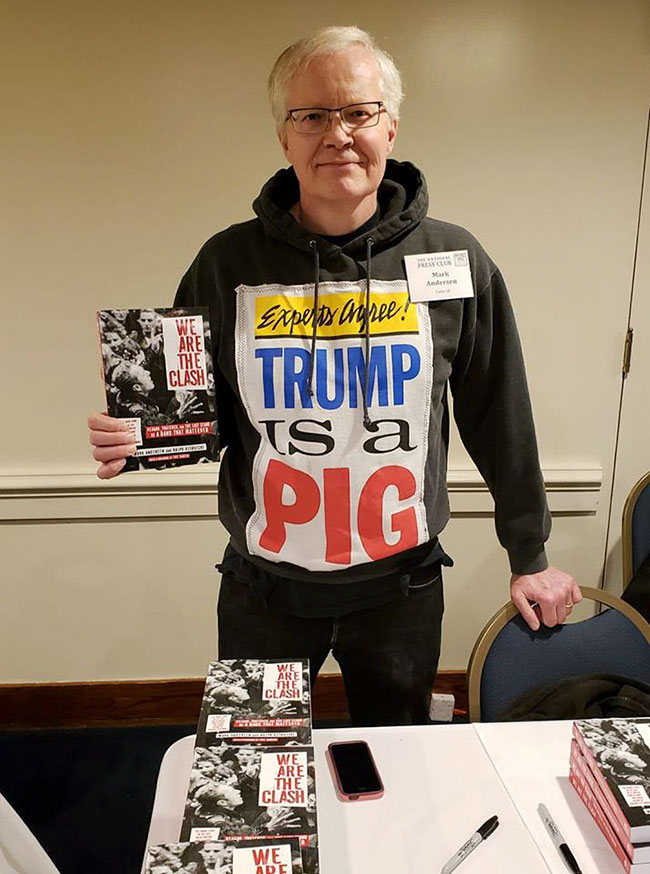
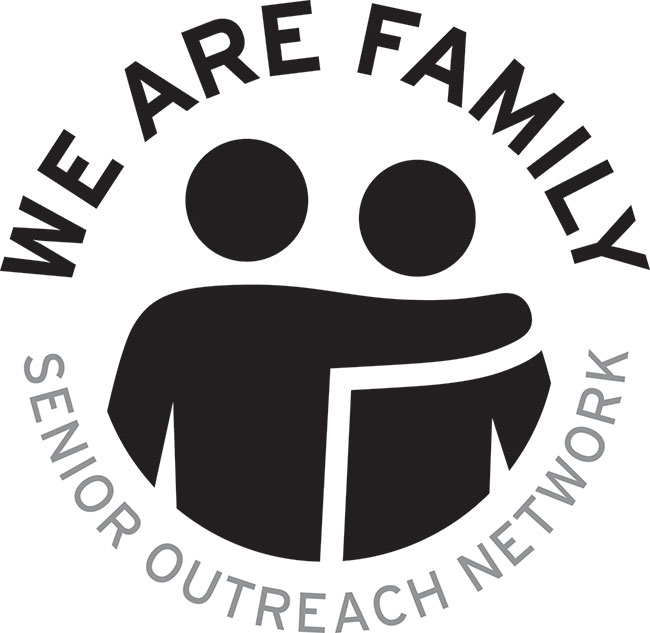
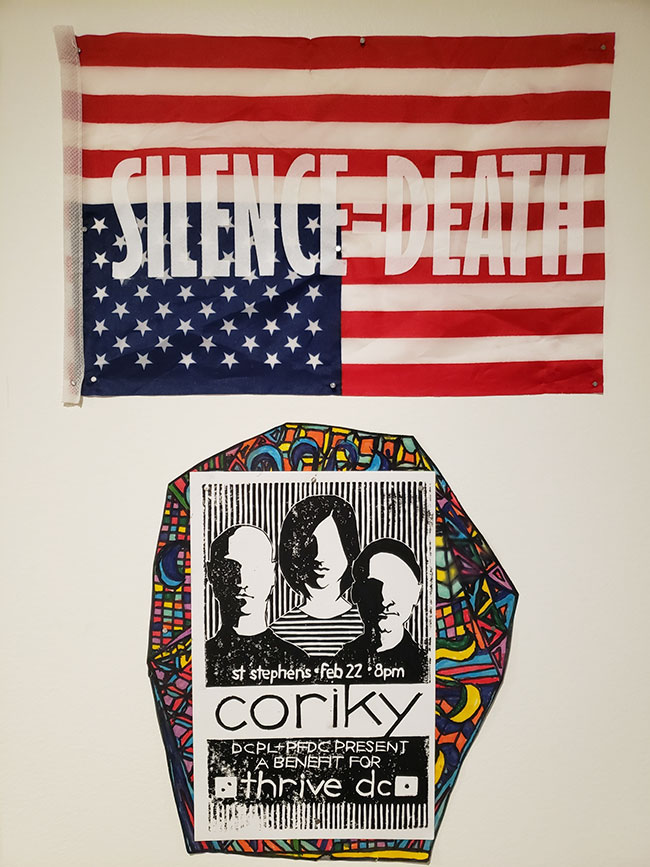
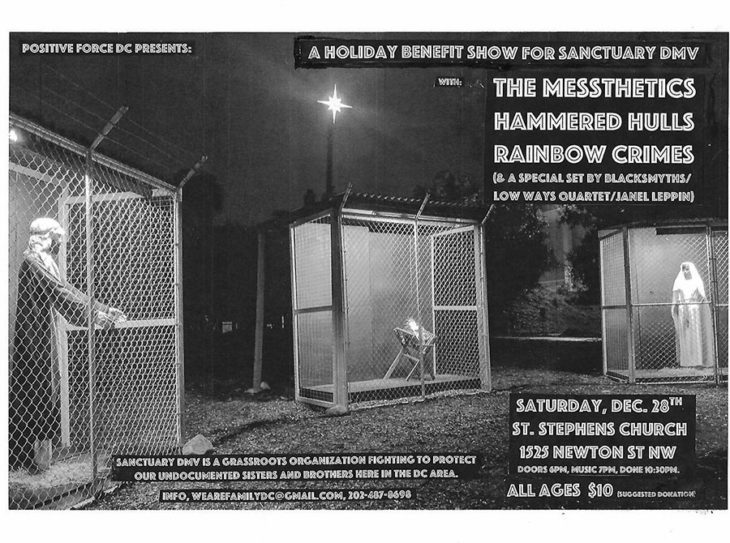
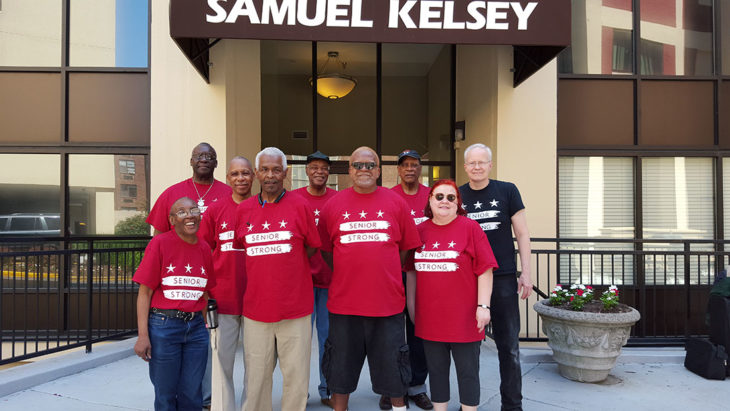
English:
Mark Andersen.
You gotta have a purpose/or this place is gonna knock you out/sooner or later.
Mark Andersen is one of the key figures in DC punk for those of us who understand punk as more than just music. Through the organization Positive Force (which is assembly-based) he has been working to make punk rhetoric (namely solidarity and mutual support) real in a context as difficult as the United States can be. We easily forget or overlook that punk has always been linked to political activism. What does punk mean to you, what voice did it give you?
This question is hard to answer in a short amount of time. I guess I would start by saying that back in the mid-to-late 1970s in rural Montana where I grew up, punk meant EVERYTHING to me. Above all, it meant LIFE itself, because at the time, I wasn’t sure whether life was worth living, given how narrow my prospects seemed to be. But the music, ideas and energy of artists like Patti Smith, Sex Pistols, The Clash, X-Ray Spex, Stiff Litttle Fingers, Avengers, the Dils and more, helped me believe in myself and the possibility of life. This place of personal affirmation, however, was the starting point. The music and its message helped me to connect my struggle to that of others in the broader world and begin to make common cause with many people who were far more objectively marginalized and/or oppressed than me. (For those who are interested, I discuss this at much greater length in All The Power: Revolution Without Illusion, available from akashicbooks.com)
That historical wave of the 70s that shaped a new counterculture such as punk is still alive and well, encouraging many self-managed experiences. What do you think is it about punk/HC that inspires so many people?
For me, it was the utterly visceral, raw and accessible passion in the music that inspired me and continues to inspire others. It wasn’t just a consumer product. There was/is the sense in punk that life matters immensely and that we all have a role to play, that we must speak and act to create our own–hopefully better–reality. “You gotta have a purpose/or this place is gonna knock you out/sooner or later” sang The Clash over 40 years ago and it still rings true. Fight for what you want your life, your world to be–that struggle itself is a gift, a route to happiness and meaning for each of us.
And now Dischord is 40 years (well, in 2020)… and how Dischord in DC inspire so many people…, also and USA?
40+ years on, Dischord means what it always has: YOU CAN DO IT. The do-it-yourself ethic shines in everything connected to the label, as well as the sense that people matter more than money, and finally, most crucially that the way the world says you “have” to function is open to question. The fact that Dischord continues to do what it does, on its own terms, with no apologies is an on-going inspiration to anyone still open to the possibilities of life, willing to challenge the world and ourselves.
Revolution Summer was the answer you gave to the existential exhaustion within the scene. Tell us a bit about the genesis of Positive Force.
For me, Positive Force was a very personal response to my sense that punk had lost its way, that the force that had inspired me to believe in myself, to live, speak and create was in trouble, that it needed a renewed focus and direction. I felt like I had been given so much; now was the time to give back. This is the natural and healthy cycle of life. It also tends to set up a “virtuous circle” where the good we give out returns to us, regenerating our own ability to offer something of worth, something real to fight for justice, to be true, to improve life for all. Fundamentally, PF was a practical way for many of us to put our punk rhetoric into action, to “live the life” we were singing/talking about.
Punk was my vehicle, simply because of my own personal history. The amazing surprise was that–miraculously enough–the right people were in the right place at the right time, creating the critical mass for Revolution Summer, a reinvention of punk that pushed us to the next level of living, and set a standard for continuing growth. For me, that energy continues to resonate, still transforming my life for the better.
Other folks in early Positive Force, of course, had their own unique motivations and visions, but I think we were all united around the idea that together we could make change happen, in our own lives and the world. We helped each other to reach towards our best selves knowing that–as an early Chumbawamba lyric goes–“isolation is the biggest barrier to change.”
(For more on this, see Dance Of Days: Two Decades of Punk in the Nation’s Capital, available from askashicbooks.com.)
What kind of activities do you do in Positive Force?
From the beginning, PF did many different types of actions. We were/are most known for our benefit concerts, more than 500 over the last thirty-five years, raising consciousness about crucial issues, connecting people to volunteer opportunities, protests and other forms of direct action while also raising hundreds of thousands of dollars for organizations working to transform our world.
Not surprisingly, PF took this energy into other avenues as well, setting up demonstrations, film showings, art shows, book discussion groups, and doing direct work to assist homeless people, the elderly, drug addicts and at-risk youth. While the COVID pandemic has largely caused PF to go on hiatus, its energy still is especially present in the outreach and advocacy of We Are Family, a grassroots non-profit that evolved out of PF and that has been incredibly active on the front lines of the crisis.
DC punks sacrificed luxury and materialism to give themselves the freedom to explore something real. Is exploring the real and doing things together one of the most genuine experiences you can have in punk?
Living simply is a way to clear away the superfluous to make space for the essential. Certainly, it was standard operating procedure for most DC punks, since it gave us the opportunity to pursue our art and activism more fully. Simply, we had to live low-cost, so that we didn’t spend all our time and energy on simple survival. We help each other have this freedom; so we should only speak of “DIY” in conjunction with “DIT”: do it yourself, but do it together. I think the fundamental insight driving us was–as Fugazi sang–“you are not what you own.” This is not a new idea, as ancient manuscripts quote Jesus of Nazareth–for example–arguing that “one’s life does not consist in the abundance of one’s possessions.” Nonetheless, since the power of capitalism is everywhere, driving us toward the opposite approach, to find our ultimate meaning in consumption, it bears repeating daily. Having power chords, bass and drums to drive the lesson home helps too. 🙂
One of the projects you are involved in now is We Are Family, which is focused on solidarity with the elderly, the forgotten. How is the project going, what acceptance has it had?
We Are Family is, for me, the most proud and meaningful outcome of Positive Force and DC punk in general. It takes the energy, passion and creativity of punk and turns it into concrete action to improve lives, foster justice and create truly compassionate and inclusive community. This mission has special meaning amidst the COVID crisis, but also generally in a community like DC, forged out of idealism betrayed by racial injustice, economic inequality and corruption. For me, We Are Family is a practical way to live out a simple, revolutionary truth: we are sisters and brothers in one family and have to take care of each other. Right now, that means we work with over 1000 seniors in inner city DC each month, providing food, encouragement, advocacy and hope, working up from a grassroots network of senior leadership. We Are Family has only 2 paid staff; the vast majority of our work is done by volunteers. This is partly by design–we feel everyone has a responsibility to look out for their neighbors, to make sure all have what they need for life–but also a response to the reality that resources are limited, so we have to do the best we can with whatever we have wherever we are right now. Our “people power” approach enables us to do an immense amount on the most slender of resources; surely a powerful punk aspiration.
We live in the utopia of being connected, but we forget those around us and especially our elders. Is loneliness a capitalist epidemic?
Any time profit is more important that people (or other living things) we will see poisonous results, whether in environmental destruction, hunger, inequality, animal abuse or simply in loneliness, especially for those abandoned on the margins of our society or exploited to make money for the rich. Technology can both help and hinder us here; we need to connect in the flesh and blood more than virtually, though sometimes the two can work together powerfully for the good. We have to make this happen, however, it will not just come to pass on its own; not with all the profit-making possibilities out there from keeping us atomized, isolated consumers. To be fair, I wouldn’t simply blame this on capitalism. Human beings have great potential for compassion and empathy but also for self-absorption and prejudice. Of course, it helps when our systems encourage the common good rather than self-seeking, so we need to move towards fundamental change on that level.
Trump’s rise obviously has objective and varied reasons. What do you think were the underlying reasons for Trump’s success?
Sadly, part of the reason for Trump’s rise is simply the legacy of racism, violence and xenophobia in American history. Genocide and slavery were cornerstones in our country’s creation and rise; we have to admit this upfront, or we will be lost. Time has eroded some of this over the past two centuries, and progress has been made… but the poison is still there, just below the surface. Trump has exploited this skillfully, and, of course, himself embodies that ugliness.
However, it is also true that economic and political elites in the USA–beginning with especially Ronald Reagan–betrayed the common people through their embrace of neoliberalism. This “free market” fundamentalism generated great wealth for some and great misery for others, especially those in the industrial heartland. This was not unique to the US, but was a global phenomenon; Margaret Thatcher played the same role in the UK, often in concert with Reagan, as my book We Are The Clash details. Together, they spread it far and wide. Bill Clinton and Tony Blair responded by pushing their respective Democratic and Labour parties in the same direction, sad to say. This opened the way for a demagogue like Trump to scramble the political mix by embracing pseudo-populist policies that won over former Democrats to his camp and narrowly win election in 2016. The same was true in the UK with Brexit, of course. We can’t ultimately defeat Trump and his movement without recognizing the costs of global capitalism and insisting on a new, more just bargain for the working class and poor as Bernie Sanders, for example, has done so well. We also can’t give up on winning over some of his supporters to our side.
The assault on the capitol was the last act of the Trump era and one of the things that became more evident was the impunity of extreme right-wing groups. Do you see in the rise of extreme right-wing groups?
The first crucial fact to acknowledge is that the electoral defeat of Trump does not undo what he has unleashed. The ugliness he capitalized on predated him and will continue for the foreseeable future, as it has deep roots in the American story. Terrorist violence in the USA is almost inevitable over the next few years. Moreover, the danger of something approaching American fascism is very real, as the continued fealty to Trump demonstrated by the Republican Party suggests. Their assault on democracy through voter suppression (now justified by Trump’s lies of a stolen election) is only accelerating. It will take determined persistent effort by Biden, Sanders and the Democrats to chart a new course. Of course, a grassroots progressive movement that presses the Democrats to chart a new, post-neoliberal course is essential; the New Deal under FDR would likely never have come to pass without just this sort of sustained advocacy from below. This is the great drama of the present American moment, and many of us are working hard to close the book on Trump and turn the page to a brighter future.
Mark, you write books. Please, tell us about your last book about the clash? Why you think its an important book with all the books, films… about joe and the band? We think this book is very important. Explain to the reader and us why its so different and important this book.
First of all, I wrote the book to pay a debt and redress an injustice. The final version of The Clash is very controversial, to say the least, but for me, it played a crucial role in revolutionizing my life for the second time. What Strummer and the others said and did in those years inspired me to re-engage with punk, just in time to help co-found Positive Force and be a participant in Revolution Summer. My life would have been immensely less rich without that inspiration. I wanted to pay back the debt owed to that version of the band by faithfully recording the aims and accomplishments of that era, even if it fell apart in the end. Sadly, the official Clash histories tend to try to erase this period. This revisionism is not right. It falsifies history, certainly, but also diminishes the true depth and breadth of the Clash story overall.
Certainly the fact that we were trying to flesh out the story of The Clash is important in itself, I think. However, we also felt that The Clash was being stripped of its politics, turned into just another superstar rock band like the Rolling Stones or Beatles. By placing the story of The Clash Mk. 2 in its full sociopolitical context, by using the band and its songs to help illuminate that era, we hoped to more fully reflect the immense ambition and meaning of the band. We believe that The Clash Mk. 2 and its story, properly understood, can still provide fuel and insight for our struggles today.
Finally, we simply thought it was a very gripping and relevant story, as the rise and ultimate fall of this version of The Clash coincided with an enormously important political moment: the victory of “free market” fundamentalism as embodied by the defeat of the titanic, year-long British miners union strike by Thatcher and Reagan’s re-election and consolidation of power in 1984-85. The resulting “end of history” capitalist triumphalism unleashed corporate globalism and deregulation. This set the stage for the near meltdown of the world economy in 2008 and the subsequent rise of both Trump and Brexit, even as the climate change crisis suggested that life on Earth itself was being placed at risk by unrestrained economic profit-seeking. This is the terrible yet possibility-filled moment whose challenges we must now rise to meet.
(For more on all of this, please check out We Are The Clash: Reagan, Thatcher and the Last Stand of a Band That Mattered, akashicbooks.com)
What are your future projects with books, films…?
I have so many ideas for future projects once the pandemic is past! In specific, I have considered doing a biography of inspirational DC activist Mitch Snyder of the Community for Creative Nonviolence, an in-depth book on Fugazi, a very personal account of my 35 years working in DC’s inner-city and/or a history of the now-demolished low-income housing complex Sursum Corda. I have lots of ideas for what a reactivated Positive Force could do as well as new initiatives for We Are Family. However, my focus right now is simply trying to be a good dad to my 11- and 7-year-old kids, and a centered and present partner to my wife, while making sure that We Are Family is meeting the immense immediate demands placed on us by COVID.
(For more on our current work, please go to wearefamilydc.org or check out :
YOUTUBE
WE ARE FAMILY 2021
Above all, right now I would love to help create a book out of Kosmo Vinyl’s brilliant “Cisco Kid vs. Donald Trump” art series, hopefully with Akashic Books or PM Press, two wonderful independent publishers run by friends from the punk world–but time is so hard to find. I don’t ever want to get back in the situation I faced with We Are The Clash, where most of the book was written in the dead of night, at great cost to my health and sanity. We can’t help anybody else if we wreck ourselves trying to do too much. After bitter, painful experience, I now know that finding and keeping balance is key to a good life and to nourishing any revolution worthy of that name.
Finally, anyone should feel free to write to me at wearefamilydc@gmail.com. Thanks for taking the time to read these words!